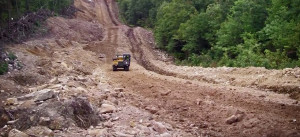Last Saturday, Lovettsville residents and citizens from across Virginia and other states as far away as Georgia, traveled to the Bears’ Den on the Appalachian trail on the Loudoun County side of Mount Weather, to share the view that fracked gas pipelines must be stopped and the scenic trail saved from “desecration.”
The folks who came were young and old, some ordinarily political partisans, but they came together, despite their differences, resolved to stop these pipelines.
If there could be any doubt about what they “really” thought, they posed with a mock 1-foot diameter pipeline segment, “inscribed,” “NO FRACKING PIPELINE.”
It was only a hint of the EQT and Nextra’s proposed 300-mile $3.2-Billion Mountain Valley Pipeline (MVP), a pipe almost four feet in diameter, carrying dangerous odorless fracked gas from West Virginia that threatens the trail and the environment.
There were testaments from the speakers, objecting to taking the land by eminent domain, and complaints about the proposed pipe’s adverse effects including air pollution, soil erosion, groundwater contamination, terrible noise levels, lowered property values, and possible onsite accidents including gas explosions like has already occurred in Appomattox, Virginia.
If the pipeline is sited as presently proposed, speakers charged, it shall destroy once and forever the natural view shed along 100 miles of the 2,200-mile scenic Appalachian Trail, including Angels Rest, Kelly Knob, Rice Fields and Dragons Tooth — among the most visited and photographed locations on the entire trail that extends from Georgia to Maine.
While Dominion’s pipeline was not the first cause for strenuous objection, it was certainly found as objectionable – if not moreso.
Dominion proposes to build the Atlantic Coast Pipeline (ACP), a 600-mile long frack pipe, the longest line in the nation – if allowed.
Dominion’s ACP line is estimated to cost $5.1 Billion, and to cross the central Appalachian region, gut the remaining wild landscape in the Eastern United States, cut ridgetops for 38 miles by 10 to 60 feet, and somehow dispose of the vast amounts of earth and boulders Dominion unearths to destroy the ridges to lay the pipe line.
Ron Tipton, the President and CEO of the Appalachian Trail Conservancy, who has worked with energy companies in the past, spearheaded the meeting held outside in the open air.
Ron described what he’s observed from various elected officials, and it’s plainly foam on a sea of political indifference.
“They don’t talk about the pipelines,” Ron said, “and it’s not enough that they say they are going to look at it.”
Republican House Delegate Randy Minchew appeared and, though an elected public official, he spoke in opposition to the pipelines. He was particularly concerned how the MVP would adversely affect the waters, and cause erosion.
Many candidates running for office in this cycle have refused to take campaign funds from Dominion. Justin Fairfax who is running for Lieutenant Governor opposes the pipelines.
“The lines will degrade the quality of water throughout the region,” Ron said.
“Natural gas is no bridge to renewables,” Tim Whitehouse, of Chesapeake Positions for Social Responsibility, said, “its effects are as bad as coal. The energy industry is spending billions of dollars on these pipelines so they can have another century of natural gas and fossil fuels compromising the environment and delaying renewables, both solar and wind.”
“Demand has flat-lined,” said Natalie Pien, of 350.org, “we are only using 51% of available energy capacity now, and, by 2036, we are projected to use 57%. We don’t need these pipelines. They are going to cost us taxpayers $218 million a year, more than twice what we pay now in taxes, and, in the end, they won’t be used, and we’ll have what the accountants call ‘stranded assets.’ NRDC says this pipeline is bad for us, bad for the environment but good for the companies’ bottom line.”
Natalie said, “Our Governor has the power to kill these pipelines like Governor Cuomo did in New York. A federal court of appeals has recently agreed that the States have the power to stop these fracked gas lines.”
On the other hand, neither the Virginia Governor, nor either gubernatorial candidate nominated by either party running statewide this year, will commit to killing these toxic pipelines.
Sean from Lovettsville said, “We’ll do what we did with the last pipeline years ago, it was called PATH, we’ll stop ‘em with the facts, and our grass root allies, and experts from the Sierra Club, with or without the pols. Isn’t that often the only way things get done?”


You can’t win if you do nothing. Yeats said it was an Irish curse to dream things the world has never seen. But, every day, because people struggle to make an idea or dream a reality, they succeed. In the case of the environment, our health and safety are at risk, a “hidden” cost of that “inexpensive” energy. Silence is a possibility of course. But you can’t win the argument you never make. JPF
The problem is when you have bought and paid for politicians that only think about filling their pockets you won’t win!!!!!!!!!!!!!!!!!!!!!